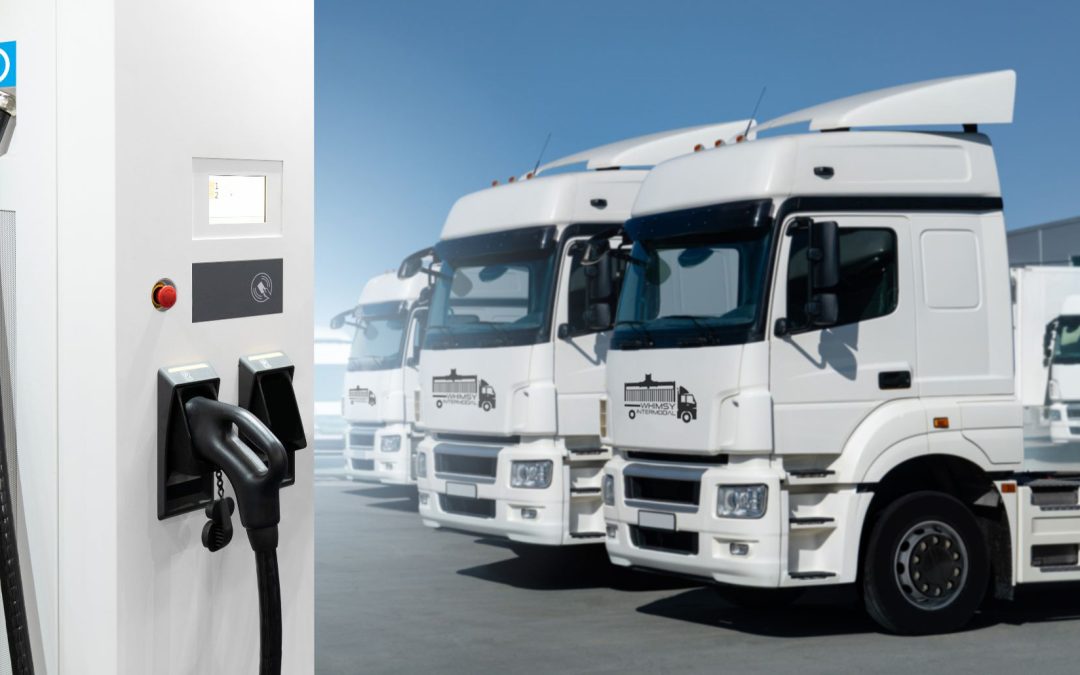In a significant stride towards sustainability, Whimsy Intermodal is enhancing our fleet with electric vehicles (EV) trucks. It’s not just about reducing emissions; this shift is at the heart of building a greener future in logistics. It signifies our commitment to innovation and environmental stewardship.
The transportation industry stands at a pivotal crossroads, as the global community intensifies its focus on combating climate change and fostering environmental sustainability. Among the most substantial contributors to greenhouse gas emissions is the commercial transportation sector. According to the Environmental Protection Agency (EPA), a staggering 15% of total greenhouse gas emissions are generated by this sector, with freight trucks alone responsible for 65% of that figure. Recognizing the urgent need for change, Whimsy Intermodal is taking decisive action to revolutionize our logistics operations by integrating electric vehicles (EV) into our fleet.
The Environmental Impact of Freight Trucks
The environmental ramifications of freight trucks are profound. Traditional diesel-powered trucks are notorious for their substantial carbon footprint, contributing significantly to air pollution and climate change. The EPA’s data underscores the urgency of addressing emissions from freight trucks and highlights the critical need for innovative solutions that can drastically reduce emissions and mitigate the impact of commercial transportation on the environment.
Enter electric trucks. According to the International Council on Clean Transportation (ICCT), a 40-metric-ton electric truck emits 63% lower greenhouse gas emissions compared to a similarly sized diesel truck. This remarkable reduction in emissions represents a transformative opportunity for the logistics industry. By adopting electric trucks, Whimsy Intermodal aims to play a pivotal role in decreasing the environmental footprint of freight transportation, aligning our operations with global sustainability goals.
Embracing Innovation for a Greener Future
At Whimsy Intermodal, our commitment to innovation and environmental stewardship drives us to explore cutting-edge technologies that can redefine the logistics landscape. The integration of electric trucks into our fleet is a testament to this commitment. However, our vision extends beyond merely adopting EV trucks; we are actively investing in the future of transportation technology.
One of the most promising advancements in this realm is the exploration of wireless charging for electric trucks. Purdue University is currently pioneering a groundbreaking project that could revolutionize how electric vehicles are charged on the go. In West Lafayette, Indiana, a quarter-mile segment of the US Highway 231/52 has been designated as the testing ground for this innovative technology. The project, titled “Dynamic Wireless Power Transfer,” aims to enable EV trucks to charge wirelessly while driving, much like a smartphone charges on a wireless pad.
Purdue University’s initiative has the potential to transform the logistics industry. The university’s researchers are working on a system that could be implemented on up to 20% of the total US interstate highway system. If successful, this technology would eliminate the need for frequent charging stops, significantly enhancing the efficiency and practicality of electric trucks for long-haul transportation. The projected timeline for the completion of this project is Summer 2025, marking a significant milestone in the journey towards sustainable transportation.
The Benefits of Electric Trucks
The transition to electric trucks offers a myriad of benefits that extend beyond environmental impact. One of the most significant advantages is the reduction in operating costs. Electric trucks have fewer moving parts compared to their diesel counterparts, resulting in lower maintenance costs. Additionally, the cost of electricity as a fuel source is generally lower and more stable than diesel fuel prices, providing long-term economic benefits for fleet operators.
Electric trucks also contribute to improved air quality and public health. Diesel trucks are major sources of pollutants such as nitrogen oxides and particulate matter, which have been linked to respiratory and cardiovascular diseases. By replacing diesel trucks with electric alternatives, we can significantly reduce these harmful emissions, leading to cleaner air and healthier communities.
Furthermore, the adoption of electric trucks aligns with the evolving regulatory landscape. Governments around the world are implementing stricter emissions standards and offering incentives for the adoption of clean technologies. By proactively transitioning to electric trucks, Whimsy Intermodal is positioning itself at the forefront of industry compliance and sustainability leadership.
Overcoming Challenges
While the benefits of electric trucks are clear, the transition is not without its challenges. One of the primary obstacles is the current limitations of charging infrastructure. Although significant progress has been made in expanding the network of charging stations, there is still a need for widespread and accessible charging solutions to support the growing fleet of electric trucks.
The Dynamic Wireless Power Transfer project at Purdue University represents a promising solution to this challenge. By enabling on-the-go charging, this technology could mitigate the limitations of existing charging infrastructure and make electric trucks more viable for long-distance travel. Additionally, continued investment in charging infrastructure, both at logistics hubs and along key transportation corridors, will be essential to support the widespread adoption of electric trucks.
Battery technology is another critical area that requires ongoing innovation. While current battery systems provide sufficient range for many applications, further advancements are needed to enhance the range, charging speed, and overall performance of electric trucks. Research and development efforts are focused on improving battery energy density and exploring alternative battery chemistries that offer greater efficiency and sustainability.
Whimsy Intermodal’s Commitment to Sustainability
At Whimsy Intermodal, our decision to integrate electric trucks into our fleet is driven by a deep-seated commitment to sustainability and environmental stewardship. We recognize that the logistics industry plays a crucial role in shaping a sustainable future, and we are determined to lead by example.
Our investment in electric trucks is part of a broader sustainability strategy that encompasses multiple initiatives aimed at reducing our environmental impact. In addition to transitioning to electric vehicles, we are implementing energy-efficient technologies in our operations, optimizing our logistics network for greater efficiency, and exploring renewable energy sources to power our facilities.
Moreover, we are actively engaging with stakeholders, including our customers, suppliers, and industry partners, to promote sustainability throughout the supply chain. Collaboration is key to driving meaningful change, and we are committed to working together to create a greener, more sustainable logistics ecosystem.
A Vision for the Future
The integration of electric trucks into Whimsy Intermodal’s fleet marks a significant milestone in our journey towards a sustainable future. It represents our unwavering commitment to innovation, environmental responsibility, and industry leadership. As we look ahead, we are excited about the possibilities that lie before us.
The potential of technologies like wireless charging and advancements in battery systems opens new horizons for the logistics industry. By embracing these innovations, we can overcome the challenges and fully realize the benefits of electric trucks. Our vision is to create a logistics network that is not only efficient and cost-effective but also environmentally sustainable and socially responsible.
Conclusion
In conclusion, the decision by Whimsy Intermodal to enhance our fleet with electric vehicles is a bold and forward-thinking step towards sustainability. The environmental impact of freight trucks is significant, but the integration of electric trucks offers a transformative solution. With a commitment to innovation, collaboration, and environmental stewardship, we are poised to lead the logistics industry into a greener and more sustainable future.
As we unveil our future, we invite our stakeholders, partners, and the broader community to join us on this journey. Together, we can build a logistics ecosystem that not only meets the demands of today but also ensures a thriving and sustainable world for generations to come.

